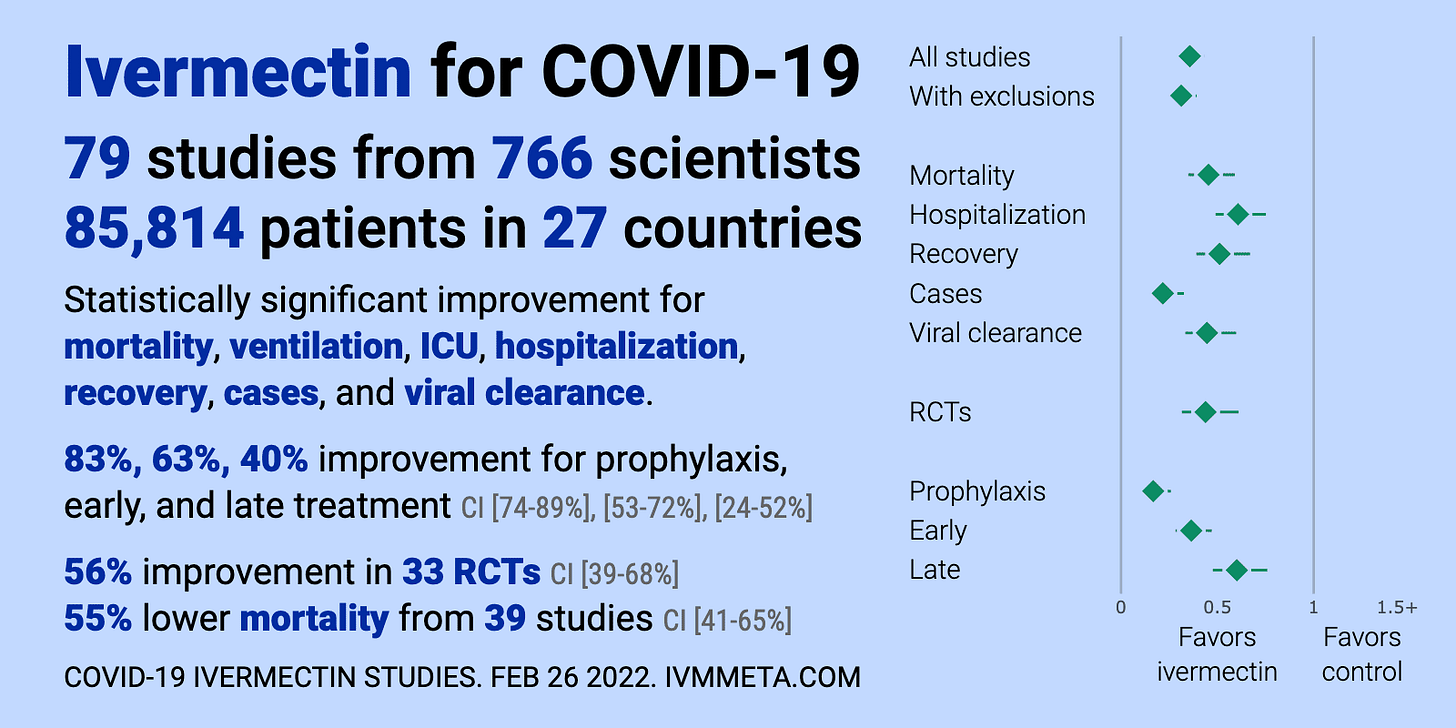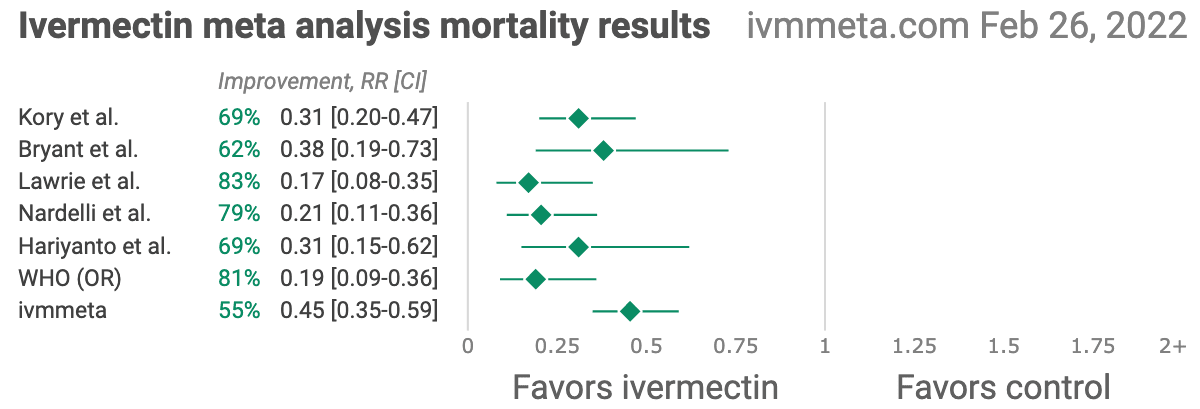Welcome to ZeroSpin! I changed the name from NonCompliant because I wanted the name to better represent the purpose of this newsletter: To share information fairly. As humans, we all bring bias to the table, myself included, but I’ll do my best to continue to pursue objectivity.
Many who aren’t in the medical field, and a large number who are, first heard of ivermectin when it hit the media in regard to Covid. So it may come as a surprise that I have over a decade of real world experience prescribing ivermectin way before Covid swept across the globe.
As some of you may know, and for those who do not, my medical practice and research has been solely devoted to figuring out the causes and mechanisms of chronic illnesses to more effectively treat them. And ivermectin has been a useful medication for many of my patients in a number of ways that I’ll detail as you read on.
It all started when I opened my doors in 1996 and was put in the unusual position of having to step in to save my father’s life when top doctors at several of New York City’s teaching hospitals failed to realize that he had a chronic infection causing his illness. He spiraled down over the many years under their care, ultimately reaching end-stage heart failure associated with a predicted survival of only months if he didn’t undergo a heart transplant. Spoiler alert: I saved his life. He completely recovered from heart failure without a heart transplant, and never had recurrent heart failure over the next 25 years of his life—He died last year at almost 89 years old.
Most people don’t realize that there are many chronic infections that underlie and cause a range of chronic illnesses. It’s been the mantra upon which my medical practice and research has been based for the past 25 years and I’ve been inspired both by my personal experiences as well as by the following landmark paper by the revered educator, Dr. Bennett Lorber, Chief of Infectious Diseases at Temple University School of Medicine from 1983 to 2006:
“…the media have largely ignored a more fundamental change in our appreciation of human-microorganism interactions: the discovery that transmissible agents may play important roles in diseases not suspected of being infectious in origin.”
Chronic infections causing chronic disease is an ever-enlarging, surprisingly well-studied area in medicine, but it’s not profitable enough yet for big pharma—Why look for the causes of, and cures for, chronic illnesses when you can suppress symptoms for a patient’s lifetime? Annuities that keep patients coming back can be way more profitable.
Even wildly expensive and highly effective cures, such as those for hepatitis C, which have sold like wildfire, have been problematic for pharma because they can shrink their potential sales markets by curing patients. But that’s a good thing, right? I mean, patients are getting cured! I personally think these drugs have been wonderful, and I think most doctors would agree with me on that, but what about pharma business folks? In a nutshell, are cures bad for business?
Given these powerful financial motivations, if pharma does find an effective medication that’s intended for short-term use, it’s reasonable to conclude that they’re only motivated to develop the drugs with shiny new patents that cost a fortune. But what happens if a cheap, safe, effective repurposed drug is found to have similar beneficial effects? Is this drug ignored? Worse yet, is it demonized?
And so I come to ivermectin. Before getting into the Covid discussion, it’s important to note the many amazing qualities of this inexpensive, safe medication that’s on the World Health Organization’s List of Essential Medicines. It’s saved countless lives globally in its use as an anti-parasitic, and for that it won its discoverers the Nobel Prize in Medicine in 2015. But in addition to that, its other diverse therapeutic effects, including broad antiviral activity, have helped solidify its reputation as a “wonder drug.”
For example, many may not know that ivermectin, even on its own, has profound anti-cancer effects without significant toxicity, unlike many traditional medications that work against cancer. And when used in combination, it can turn chemotherapy-resistant cancers into chemotherapy-sensitive ones, as well as work synergistically with non-traditional anti-cancer agents, such as dichloroacetate.
Ivermectin can also induce remyelination. Myelin is the lining around nerve cells that gets destroyed in MS—Ivermectin can reverse this in MS animal models. (This is a complex topic beyond the scope of this post, and not without caveats, so I’ll plan to write a separate post about MS soon.) Ivermectin also promotes the regrowth of damaged peripheral nerves and functions as an immunomodulator, meaning that it helps fix an abnormal immune response. And to top it off, “Ivermectin has continually proved to be astonishingly safe for human use.”
Given the above, you might imagine that ivermectin could be useful for patients suffering from chronic infections that confuse the immune system, as such patients frequently wind up with long-term neurologic damage. And that’s why I have so much experience with it, even before Covid. I’ve prescribed it for countless patients over the years and it’s been enormously helpful for a significant subset.
The potential for this decades-old, highly-regarded medication is clearly huge. So where are the large randomized-controlled trials evaluating efficacy for these various conditions? Did I mention that it costs pennies?
Ivermectin for Covid
Now for the Covid discussion. Thank you to ivmmeta.com, which does a great job keeping tabs on the ever-evolving ivermectin for Covid database. There are currently 79 studies evaluating ivermectin for Covid from 766 scientists, which include over 85,000 patients from 27 countries. And they overwhelmingly demonstrate that ivermectin is helpful against Covid.
Here are the ivermectin studies divided up by stage of illness. What follows are studies using ivermectin to prevent Covid, ivermectin as an early treatment, and ivermectin as a late treatment for Covid. The green represents studies that show benefit, and the red represents studies that do not.
There have now been so many studies on the use of ivermectin for Covid that there have been several meta-analyses on the topic. This is where studies are combined and evaluated based on their united power. They also, unsurprisingly, demonstrate that ivermectin has good activity against Covid.
And while it’s too soon to draw conclusions about how ivermectin will work in Covid patients with the Omicron variant, as there’s a lag time for enough studies to be completed and published, there is data of an “anti-viral effect” against Omicron as well as other variants.
Ivermectin has not gone unnoticed by governments around the world. Health agencies in Argentina, India, Philippines, and many others, have all reported remarkable benefits to Covid patients treated with ivermectin.
And yet, somehow, NIH doesn’t recommend ivermectin for Covid:
“There is insufficient evidence for the COVID-19 Treatment Guidelines Panel (the Panel) to recommend either for or against the use of ivermectin for the treatment of COVID-19. Results from adequately powered, well-designed, and well-conducted clinical trials are needed to provide more specific, evidence-based guidance on the role of ivermectin in the treatment of COVID-19.”
And astoundingly, FDA tweeted:
Lethal? That’s like saying that drinking water can be lethal or walking can be lethal, because they both can be.
The fact is that every drug has risks, including ivermectin, but over decades of global use and billions of doses prescribed, it’s proven itself to be an exceptionally safe drug, orders of magnitude safer than many prescription and over the counter drugs. Acetaminophen has held the top spot as the leading cause of calls to poison control centers, yet somehow it escaped a snarky tweet from FDA.
And to add insult to insipidity, FDA was reportedly:
"delighted by its "edgy" Ivermectin tweet, per internal documents.”
“Edgy” isn’t the first word that comes to mind. I think a more apt description would be “egregiously irresponsible.”
So Many Coincidences
Was it just serendipity that shortly after the FDA ivermectin horse tweet came out, a physician claimed that ivermectin overdoses were jamming up hospital emergency rooms? The ivermectin “overdose” story was picked up by major media everywhere, including this one here by Rolling Stone:
“The ERs are so backed up that gunshot victims were having hard times getting to facilities where they can get definitive care and be treated,” McElyea said.
“All of their ambulances are stuck at the hospital waiting for a bed to open so they can take the patient in and they don’t have any, that’s it,” said McElyea. “If there’s no ambulance to take the call, there’s no ambulance to come to the call.”
Except it was all a hoax. Here’s what the hospital said:
“Dr. McElyea has not worked at our Sallisaw location in over 2 months. NHS Sequoyah has not treated any patients due to complications related to taking ivermectin. This includes not treating any patients for ivermectin overdose.”
And was it another coincidence that within that same span of about two weeks, pharmacies stopped filling prescriptions for ivermectin and insurance companies stopped covering it? I didn’t have ivermectin prescriptions questioned in the prior many years of prescribing it, but within two weeks, all that changed.
If these were not coincidences, the implications would be staggering. It would have required an enormous coordinated effort between government, private industry, and media.
And was it yet another coincidence that just a few weeks later, Merck announced data about its new Covid drug molnupiravir? Unfortunately, molnupiravir has considerable toxicity concerns and its efficacy against Covid is lackluster, but that’s beside the point.
I have no idea if the timing of Merck’s announcement was purely coincidental, but I’ll never forget when 60 Minutes covered the Merck Vioxx debacle and the shocking events that came to light:
“Merck made a "hit list" of doctors who criticized Vioxx, according to testimony in a Vioxx class action case in Australia. The list, emailed between Merck employees, contained doctors' names with the labels "neutralise," "neutralised" or "discredit" next to them.”
A Dangerous Double-Standard
Ivermectin is cheap, safe, and effective, with statistically significant benefits demonstrated for Covid patients in many studies. Remdesivir on the other hand, is expensive and carries significant concerns regarding toxicity. Remdesivir also doesn’t demonstrate a statistically significant reduction in mortality, requirement for ventilation, or duration of hospital stay in large rigorously-designed studies of Covid patients, and its use with Covid is recommended against by WHO.
And yet remdesivir retains its emergency use authorization as a treatment for Covid while ivermectin is ridiculed and marginalized.
The Truth is the Only Real Currency We Have
So friends, we have a sticky situation. Someone (and never forget that large governing bodies are made up of the same flawed humans that characterize the rest of our species) is not telling the truth. It’s up to you to decide.
Not that I’m the final arbiter of anything, but here are my two cents based on my professional experience: I’ve treated about 300 Covid patients to date and have used ivermectin as part of a multi-pronged approach since the first evidence came out for its efficacy. I consider all my patients to be at high risk given their underlying complex chronic health conditions and many of them have other traditional risks such as obesity, high blood pressure, and heart disease. None have died. I had one patient require a short hospitalization but she came to see me after 5 days into Covid, by which time the inflammatory phase of illness typically begins. She also has an immune system disorder. Like with any other infectious disease, early intervention is imperative.
Do I think that ivermectin is a panacea? No. Have I ever seen it fail in the prophylactic setting? Yes. Would I rely on only ivermectin to treat Covid? Never. Do I think that ivermectin can be a useful agent in our global struggle against Covid? Absolutely yes.
We require thoughtfulness and nuance to approach matters of great importance. It’s not an all or none game. The false dichotomy is a common tool in propaganda, but truth is often found, hiding in plain sight, upon neutral ground.
If anyone from NIH or FDA is reading this, why can’t we have more transparency on how health advisory decisions are made? It’s no secret that public trust in federal health agencies has been enormously eroded. You can make this right. The public pays your salary. We deserve the truth and we deserve not to be harmed by your actions or inactions.
I want to personally thank you for taking the time to consider my thoughts. I so appreciate your subscription to this newsletter (and am extraordinarily appreciative of those generously opting for the paid subscriptions!). If you like what you’ve read here today, please share it with your friends.
Disclaimer: None of my posts contain medical advice. These posts are intended for purely informational purposes only. Please check with your doctor before undertaking any course of treatment.











GREAT article - shared on my social media to hope raise awareness - had no idea of all these additional benefits. Wow. Thanks so much.
Well balanced and informative. Clearly no secret that ivermectin is a valuable tool to have in our arsenal. Is there a reliable and safe source you would recommend getting it from? Thanks again for sharing your knowledge Dr. Philips!